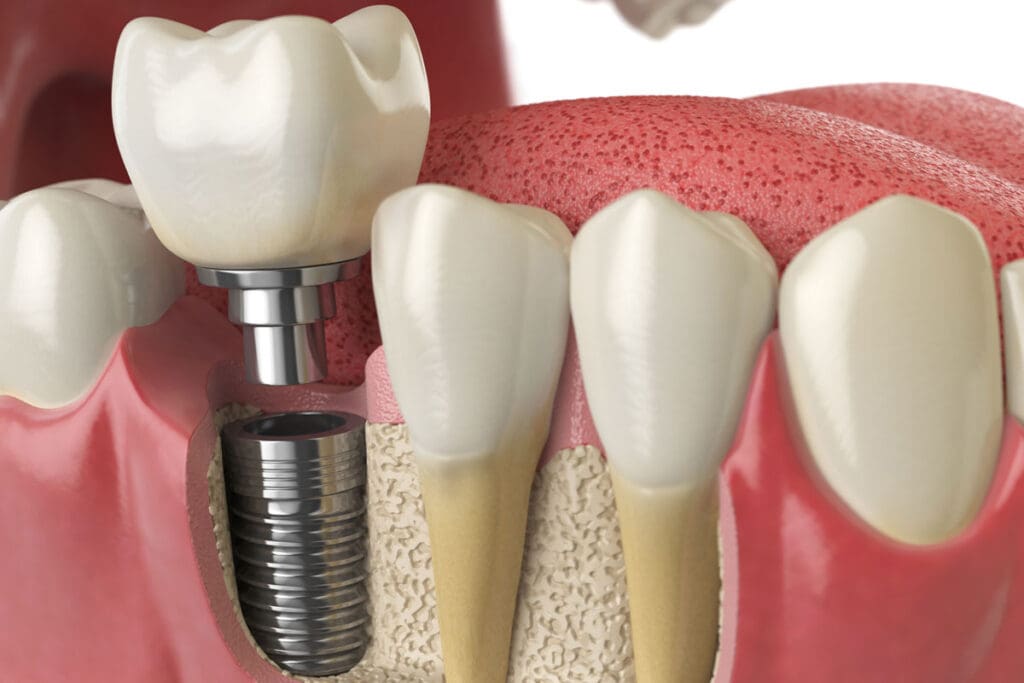Dental implants are the most durable and sturdy method of tooth replacement. They replicate a natural look and feel, but they’re expensive and may not be right for everyone. Learn the benefits and drawbacks.

What Are Dental Implants?
Dental implants are medical devices surgically placed in the jaw to replace missing teeth. They’re durable, and sturdy, and meant to replicate the look and feel of natural teeth.
Dental implants are metal screws usually made of titanium and serve as the roots of missing teeth, used to hold artificial teeth in place by supporting crowns, bridges, or dentures.
In the majority of cases, these implants are safe and have a success rate above 97% for 10 years. But with regular dental checkups every six months, as well as regular brushing and flossing, they can last a lifetime. However, the crown on an implant typically lasts 10-15 years before needing replacement.
By comparison, complete dentures last 10.1 years on average, and dental bridges need replacement every 5-15 years.
How Dental Implants Are Installed
Dental implants are surgically placed in the jaw through a procedure that takes around 90 minutes. However, the whole process requires multiple dental appointments and can take as long as 6 to 12 months.
The titanium implant is surgically inserted into the jaw, then an abutment is screwed into the implant that connects the custom-made crown.
In some cases, a person experiencing bone loss may not have enough stable bone around the lost tooth, and a bone graft must be performed first. It typically takes 3-4 months for the bone graft to heal and stabilize before an implant can be placed.
The Benefits of Dental Implants
Dental implants have many benefits over other available alternatives such as bridges and dentures.
Solid Support and Feel
Because they are screwed into the jaw, it is very durable and stable. Implants can support a single tooth, a bridge, or dentures, making them more stable. These implants have high success and durability rates.
Natural Look and Feel
With a crown attached to a dental implant, it looks, feels, and acts like natural teeth.
Stabilizes Adjacent Teeth
When you lose a tooth, the surrounding teeth can migrate toward the gap. An implant fills this gap and keeps the other teeth stable.
Mimics Natural Teeth When Chewing and Speaking
When chewing, the stability of a dental implant closely mimics the actions of natural teeth.
People who wear dentures notice minor problems with their speech, such as “S” sounds. However, implants have been shown to preserve speech patterns. Plus people who wear overdentures (removable dentures that attach to one or more implants) noticed that the implants also helped their speech patterns as compared to traditional removable dentures.
Restores Bite Force
Due to the stability of dental implants, researchers have found that they increase the binding force of the lower jaw, unlike traditional dentures.
The Drawbacks of Dental Implants
For all the benefits that dental implants provide, they do have some drawbacks and are not the best solution for everyone. Here are some things to consider in determining if they are right for you.
Implants Require Dental Surgery
As with all surgical procedures, this surgery comes with some risks, including:
- Allergic reaction to anesthetic
- Bleeding
- Infection
- Nerve or tissue damage
- Gum recession
- Implant failure*
*It should be noted that smokers have a higher rate of implant failure, with failures in 11% of smokers as compared to 5% of non-smokers.
Length of Time to Complete Procedure
The entire implantation process requires multiple dental appointments.
If you do not have enough bone to support the implant, you may require a dental bone graft first, which could take 3-4 months to complete and heal.
It typically takes 6-12 months to complete the entire process.
More Expensive / Insurance May Not Cover Implants
Dental implants are generally more expensive than other types of treatment options, such as bridges or dentures. There is a strong possibility that your dental insurance may not cover them. That means you will have to pay the entire cost of the dental implant procedure(s) out-of-pocket.
As of this writing, the average cost of a single-tooth dental implant procedure in the US was $3,000-$4,500. The crown is the most expensive part of the dental implant and currently ranges between $1,000-$3,000.
Supporting dentures with a full-arch set of 4 implants (referred to as an all-on-4) can range from $15,000-$30,000 (or more) per arch (full set of top or bottom teeth), with an average of $26,500. Therefore, it currently takes $30,000-$60,000 to support top and bottom arches (complete dentures) with implants.
Reasons You May Not be a Good Candidate
Generally speaking, the ideal candidates for dental implants are people with overall good dental health who need to replace a missing tooth or teeth. That includes someone who needs a tooth extracted. Further, a person needs to have good enough health to undergo dental surgery.
You May Not Be Elligible If You Have…
- Uncontrolled diabetes
- Heavy smoking habit
- Blood-clotting disorders
- Metabolic bone disease
- Active cancer treatment
Final Thoughts
Dental implants are one of the most stable and durable ways to replace missing teeth — like single teeth with a crown — or to support bridges or dentures.
Dental implants look and feel natural, and provide long-lasting results. However, they are more expensive than other treatment options.
Talk to your dentist about whether an implant is the right option for you.









